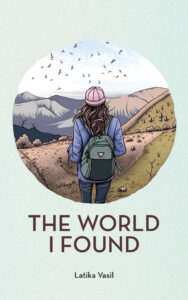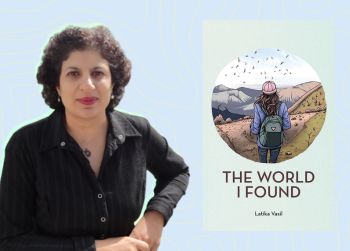 The World I Found is the debut novel by Wellingtonian based Indian New Zealander Latika Vasil.
The World I Found is the debut novel by Wellingtonian based Indian New Zealander Latika Vasil.
This emotional and exciting young adult read is an apocalyptical ‘what if’ novel, in which 15-year-old Quinn returns from a visit to the remote Campbell Island only to discover everything has changed, everyone has vanished, phones don’t work and there is no power. How do they go about navigating and surviving in this new world?
 Latika Vasil lives in Te Whanganui-a-Tara Wellington. She has worked as a university lecturer, a researcher, a creative writing tutor and currently as a freelance writer. Her fiction has been broadcast on Radio New Zealand, and published in many anthologies and magazines. The World I Found is her first novel.
Latika Vasil lives in Te Whanganui-a-Tara Wellington. She has worked as a university lecturer, a researcher, a creative writing tutor and currently as a freelance writer. Her fiction has been broadcast on Radio New Zealand, and published in many anthologies and magazines. The World I Found is her first novel.
Dystopian novels have a long and noble history and the opportunity to ask someone who is adding to this illustrious canon was just too good to miss. So, to celebrate the release of The World I Found we asked Latika to select her top five dystopian novels.
We wish to extend our heartfelt thanks to Latika Vasil for taking the time to write this list!
Station eleven / Mandel, Emily St. John
Station Eleven – Emily St. John Mandel
Despite the bleakness of a world destroyed by a deadly virus, Station Eleven offers the reader moments of incredible beauty amongst the gloom. I loved the writing and the meticulous worldbuilding. The book follows the stories of various characters across different timelines, but the storyline that stuck with me the most was the one that followed The Traveling Symphony, a rag-tag group of musicians and actors, as they roamed through a post-apocalyptic world performing for survivor communities. In the face of an almost total collapse and the loss of technology, Station Eleven shows that art will endure.
The road / McCarthy, Cormac
The Road – Cormac McCarthy
The Road follows the journey of a father and his young son as they walk across America after an unspecified apocalyptic event. McCarthy’s writing style is spare which perfectly mirrors the unrelentingly bleak landscape through which the pair are travelling. Some readers may find the book too dark and pessimistic but I loved its intensity. It will break your heart many times over but it is a masterpiece of dystopian fiction and the deep love between father and son is truly beautiful to read. We never find out what caused the devastation but it is timely to consider climate change as a contender for leading to this type of future.
The day of the Triffids / Wyndham, John
The Day of the Triffids – John Wyndham
I loved science fiction as a child and The Day of the Triffids was one of the first books I read when I transitioned from children’s/YA books to adult sci-fi. I think reading The Day of the Triffids and George Orwell’s 1984 started my interest in dystopian fiction. The story begins with most of humanity suddenly blinded by a freak meteor shower and then, newly vulnerable, preyed upon by man-eating walking plants! The portrayal of how quickly society can collapse is both fascinating and frightening and something I’d like to explore further in my own writing.
The handmaid’s tale / Atwood, Margaret
The Handmaid’s Tale – Margaret Atwood
Every list of the best dystopian novels should include this timeless classic by Margaret Atwood in which a future America has turned into a hellscape where women’s freedom and reproductive rights are controlled by a repressive religious regime. Handmaids, like the main character Offred, are forced to bear children for the infertile ruling class. When I first read this novel, the dystopian storyline seemed fanciful but reading the news coming out of present-day America fills me with dread and admiration for Atwood’s prescience. Novels that question power structures are always appealing to me and The World I Found also taps into issues of power and control.
Fatherland / Harris, Robert
Fatherland – Robert Harris
I enjoy books that combine genres and Fatherland does this very effectively. It is a thriller, a police procedural and a speculative history novel. It is definitely a dystopian work, depicting an alternative world in which the Nazis have won the Second World War. Genres such as thrillers highlight the importance of pacing and Fatherland is definitely pacy and exciting. When writing The World I Found I tried to keep the pacing fast and hopefully a page-turner for young readers.
“This emotional and exciting young adult read is an apocalyptical what if novel. In which Fifteen-year-old Quinn returns from a visit to the remote Campbell Island only to discover everything has changed everyone has vanished , phones don’t work and there is no power. How do they go about navigating and surviving in this new world?” (Adapted from Catalogue )
Rising to the surface / Vasil, Latika
“A businessman meets a tattoo artist on a plane and finds his world beginning to unravel. A desperate real estate agent has one last chance to make a sale. A rock star lookalike postie steals a postcard and has a change of luck. An eccentric boy with an interest in Winston Churchill’s parrot receives a diagnosis – but will his mother accept it? A lonely woman befriends the boy next door, who shares his love of pyrotechnic experiments and letters from Africa from his missionary mother. The wife of a notorious murderer drives to prison to collect him on his release, and wonders if she really knows who he is. These are some of the characters that form the cast of this dazzling début collection of stories by Latika Vasil. ” (Adapted from Catalogue)


